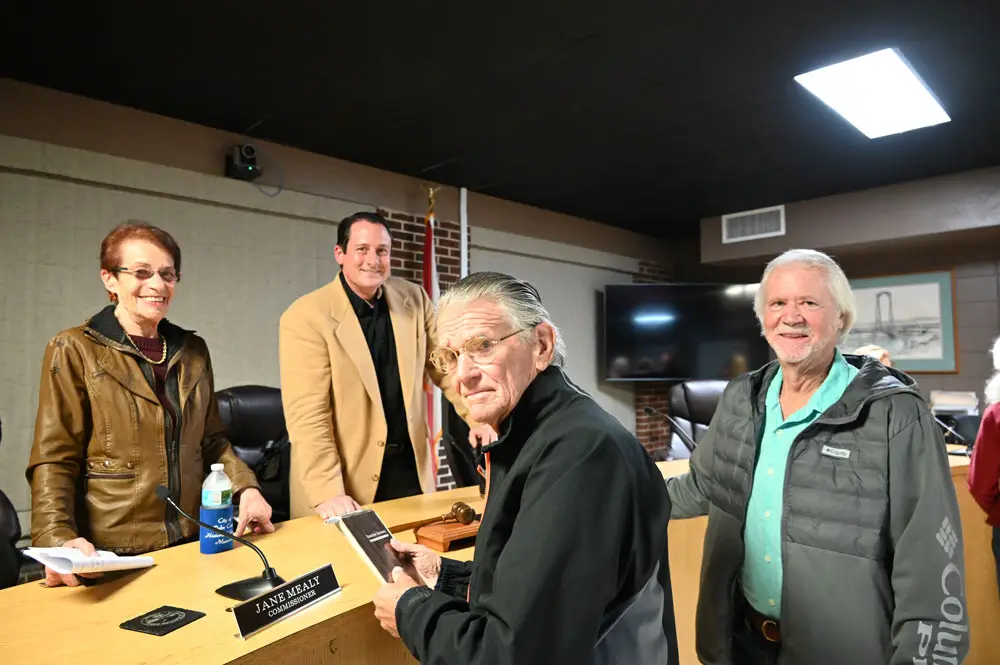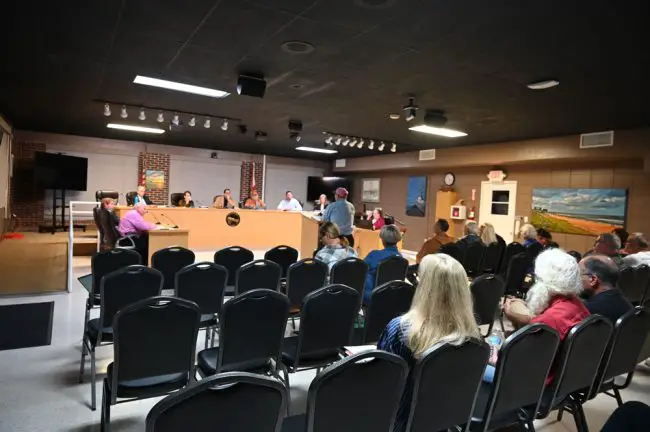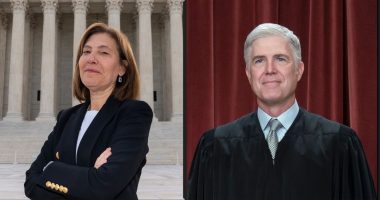
With a majority of city commissioners and the public speaking their skepticism about changing the make-up of the Flagler Beach City Commission, giving the mayor more voting or veto power, or changing the lengths and limits of commissioners’ terms, a proposal to go down that road appears to be teetering on the edge of a failing vote, if it comes to that. But it won’t.
Look for the reappointment soon of a charter review commission to discuss the slate of proposals, removing the issue from the fraught territory of an election season or the politically tendentious hands of commissioners.
The commission held a special workshop Thursday evening to discuss the proposals first raised by Commission Chairman Eric Cooley and, more pointedly, to hear from the public. It did both, with one novel addition Cooley proposed today: expanding the mayor’s veto power. That power is currently limited to resolutions or ordinances.
A clever city manager can craft proposals in such a way as to make the risk of a veto moot, by putting initiatives before commissioners outside the stream of resolutions or ordinances. Mayor Suzie Johnston has felt manipulated and silenced by those schemes by a previous city manager. (Cooley is running for re-election. Johnston, his companion, is not.)
“If we just expand the mayor’s veto power, we don;t need to change the whole construct of the city commission,” Cooley said. He’d explained where that idea came from: he’d recoiled, as had some residents, at the way several commissioners dressed down Johnston in July 2022 (reducing her to tears), claiming she was overstepping her role when she called other governments to research employees’ cost-of-living increases and when she researched the county’s IT contract. The critical commissioners were wrong: Johnston had not acted beyond her authority. The city attorney corrected the critical commissioners. The matter was resolved.
But obviously not. This is where the personal and the political intersected, incubating what resulted in Cooley’s proposals. He said he waited until now to issue them, knowing that Johnston would be leaving the commission.
“Expanding the veto power with heavy guard rails, strong guard rails, would be a good solution,” Johnston said Thursday evening.
For the most part term limits and changing the length of commissioners’ terms drew almost no support, including from Cooley. That left the mayor’s role: should the mayor be a voting member of the commission, reducing the commission to five members?
A majority of commissioners and of the public did not understand where the proposal was coming from, why it was needed, how it could be justified, and why it was being proposed now, in the midst of an election, when it could or should have more properly have been discussed in the context of a charter review process.
Commissioner Scott Spradley had been key in slowing Cooley’s push for a vote in late December to put several proposals on a ballot referendum. What’s the hurry? he’d asked, redirecting the momentum toward what resulted in the workshop. At the time, Spradley declared himself open to possibilities. But he wanted to get educated first. Spradley may be a first-year commissioner, but he’s chaired several advisory boards, and was the last chair of the last Charter Review Commission five years ago.
Thursday evening, he summed up the skepticism several of his colleagues and most of the residents he spoke with felt about the proposals.
Giving the mayor a vote would reduce the number of commissioners, which he said was not acceptable. He was more open to expanding the veto power of the mayor. But looking at the proposals in whole, he asked: “What is the compelling reason to do that? I know Eric just said he’s wanting to look at ways to solve problems. I’m at a loss to understand what the problem is in the current makeup of the city commission, the mayor, the mayor having veto power. I just have not run into anyone who’s explained to me what the problem is with that. What’s the compelling reason to change? And then the last thing is why now?” Especially with the major issues before the commission now, from stormwater problems to pier reconstruction to a new hotel rising. “Why now do we talk about a change in the form of government on the eve of all these things happening?”
Spradley had also reviewed the minutes of the last two Charter Review Commission meetings. At no point were the proposals Cooley put forward discussed.
The charter review process to take on Cooley’s suggestions was proposed by Linda Provencher, the former commissioner and mayor who, as an elected official and since, has wielded a disproportionate ability to sway the commission, or open its eyes–as she did again Thursday.
She was last to speak from an audience of just 19 people, but truly “not least,” as someone on the commission said when she walked up to the lectern. “I wanted to become mayor because I wanted to be able to talk to the public and bring both sides of an issue to the commission,” she said. Turning the mayor into a commissioner would be ill advised: “If you have a bad mayor, that’s now a bad commissioner,” and the commission has no veto anywhere.
Skeptical as she clearly was about changing anything, she suggested the charter review process. “I know we do it every 10 years but I believe we can do it sooner if we’d like and there’s probably a few things now with the way our city is changing that other things need to be looked at,” Provencher said. “At that time you can go through this.” It wasn’t going to be on the March ballot anyway, she said.
The workshop audience was a reunion of sorts, with Don Deal, who had chaired a previous Charter Review Commission and long chaired the city’s planning board, John Feind, the former city commissioner, and Patti King, the future mayor, all in attendance. They all added to the skepticism about the proposals, with Deal and Feind reminding the commission of the early 2000s, when a block of three commissioners reduced the government to what Feind called–and what was immortalized in a DVD as–a “freak show,” at times circumventing the mayor’s veto on key issues.
“The veto power is very important for the commission, for the town,” Fiend said. “It’s definitely important that you maintain the balance of power.”
There was no unanimity against the proposed changes. One of the people speaking in favor of some of the changes was Bob Cunningham, the only candidate challenging Cooley for a commission seat. Cunningham thinks there should be a voting mayor: “If the mayor is in lockstep with the rest of the commission and doesn’t exercise her voting power, it really doesn’t provide any benefit,” he said. He supports three-year terms, but also term limits, as non-incumbents tend to.
Commissioner James Sherman had been hard to read before on Cooley’s ideas. He was a clearer read Thursday, recalling having several uncontested elections in the city’s recent history. At one point he thought term limits might be ideal, but he doesn’t think the city has the population to support that. He also supports three-year terms. Commissioner Jane Mealy, always Cooley’s strongest opponent, was also the strongest opponent of the changes he was proposing from the start. THat didn’t change Thursday.
Commissioner Rick Belhumeur summarized the evening in a few words: “A lot’s been said and most of it’s been kind of leave it alone.” Noting the dearth of people in the audience, he said the proposals would have drawn more interest had there been an interest in pursuing them. He, too, lent his support to Provencher’s proposal, saying a charter review approach would give room to the public to show up at multiple meetings and discuss the matter more deliberately.









